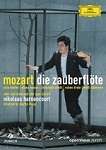|
Back
05/21/2008
Wolfgang Amadeus Mozart: Die Zauberflöte, K. 620
Matti Salminen (Sarastro), Elena Mosuc (Queen of Night), Christoph Strehl (Tamino), Julia Kleiter (Pamina), Ruben Drole (Papageno), Eva Liebau (Papagena), Gabriel Bermúdez (Speaker), Rudolf Schasching (Monostatos), Sandra Trattnigg (First Lady), Martina Welschenbach (Second Lady), Katharina Peetz (Third Lady), Daniel Krähmer, Eric Price, Frederic Jost (Three Boys), Andreas Winkler (First Man in Armor, First Priest), Tomasz Slawinski (Second Man in Armor), Morgan Moody (Second Priest), Orchestra of the Zürich Opera, Nikolaus Harnoncourt, (Conductor), Martin Kusej (Director), Rolf Glittenberg (Stage Design), Heidi Hackl (Costume Design), Jürgen Hoffmann (Lighting Designer)
Recorded at the Zürich Opera House (2007) – 226’ + bonus: Behind-the-Scenes documentary with interviews
Deutsche Grammophon 0440 073 4367 – Booklet in English, German, and French – Subtitles (opera) in English, French, Spanish, Chinese; (documentary) in English, French, Spanish

The supplementary materials to Deutsche Grammophon's new Zauberflöte inform us that conductor Harnoncourt elected to revisit the opera after twenty years largely because of his faith in director Martin Kusej's ability to re-imagine the piece "afresh and without prejudice" for a contemporary audience. If the reviews of the endeavor were any indication, the creative team was quite successful in achieving exactly that, the production proving a popular success and garnering raves all round. Happily, the preservation of the mounting on DVD suggests what all the kudos were about.
It should be said at once that those who expect their Flutes to be served up as gossamer, fairy-tale confections, or those who dislike updating classic works in general, will not be pleased. The characters here are all presented in modern, formal to business attire, in a starkly utilitarian setting - no suggestion of a fantasyland Egypt here. Moreover, this is a rather dark Flute, a little creepy, and possibly a bit charmless - this in a piece one often turns to for charm.
More open-minded opera lovers, however, should be immediately intrigued, and the resistant would be well advised to avoid turning away too soon - they might just discover something fascinating in this mounting. Harnoncourt is on record as saying the work is about "love, love, love", and though matters are not exactly warm and runnily presented, the marriage of Tamino and Pamina - from the first visual fielded during the overture, which finds them standing together in a frame before being abruptly pulled apart - is the unifying concept; the heroine indeed wears bridal attire throughout the piece. Rolf Glittenberg's setting, an arrangement of plain grey walls and doorways that revolve about to establish the different locales, variously suggests a labyrinth, or a suffocating industrial environment. A number of interesting ideas play themselves out - the Three Ladies for example, despite their modern business chic and sunglasses (courtesy of designer Heidi Hackl) are clearly creatures of the night, blinded (literally) by the promising daylight of Sarastro's realm, as is the evil Queen.
Harnoncourt's fleet crisp handling of the score is exemplary, bringing an incisive period consciousness to the modern orchestra. Tempi are generally brisk, with an exception here and there - Papageno's entrance, for one - though the extremes in tempi often demonstrated by this Maestro are little in evidence here. This is lovely playing indeed.
There is an excellent cast. Matti Salminen is the most familiar name, and though he is admittedly caught here somewhat late in the day, he remains in fine, firm voice and is most commanding as a sort of “über-CEO” of a Sarastro. The most winning performance, however, is contributed by the aptly named Ruben Drole as a delightfully warm and amusing Papageno - very much Tamino's equal in a more street-wise, blue collar way, with Julia Kleiter's womanly, full-bodied lyric Pamina close behind. Christoph Strehl sings appealingly as Tamino, his quick vibrato lending an immediacy that is often effective, though his dramatic work is a bit stolid compared to that of his colleagues. Mosuc is an adequate Queen, executing her direction very effectively, particularly in a most unusually presented revenge aria (this woman literally has a cold heart, here emerging from the deep freeze), though she negotiates the coloratura somewhat gingerly, despite a solid F in alt. Eva Liebau is a pert Papagena, and Rudolf Schasching is a truly frightening Monostatos, not at all the usual buffoon.
The production has the tremendous advantage of the intimate Zürich Opernhaus as venue, which facilitates the dialogue to be gracefully delivered in an unforced, naturalistic fashion, as is rarely the case when performers are hurling their lines to the back of a 4.000 seat auditorium. The behind-the-scenes bonus material is excellent, with some revealing interviews - director Kusej assesses the work of his predecessors in the piece a bit dismissively, but he certainly has the courage of his convictions. Picture and sound quality are excellent and the tracking is generous and sensibly done.
Mark Thomas Ketterson
|